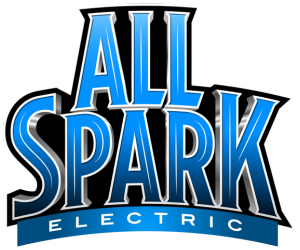If you’re planning an electrical project at home, one of the most important things to understand is 30 amp breaker wire size. Using the wrong wire size for a 30 amp circuit isn’t just a code violation—it can lead to overheating, damaged equipment, and serious safety risks.
At All Spark Electric in Fort Worth, TX, we often get calls from homeowners wondering what gauge wire to use for specific breakers. In this guide, we’ll explain everything you need to know about wire sizing for 30 amp breakers and when to call in a professional.
What Is the Correct Wire Size for a 30 Amp Breaker?
The correct wire size for a 30 amp breaker is 10-gauge copper wire.
This is based on the National Electrical Code (NEC), which provides the standard guidelines for electrical safety in residential and commercial buildings. A 10 AWG copper wire is thick enough to safely carry up to 30 amps of current without overheating or tripping the breaker unnecessarily.
If you’re using aluminum wire instead of copper (which is less common in modern residential applications), you’ll need a thicker 8-gauge aluminum wire. That’s because aluminum isn’t as conductive as copper and must be upsized to handle the same load safely.
Why Wire Size Matters for Breaker Circuits
You might think that using any wire that fits is good enough, but electrical systems don’t work that way. Undersized wire creates resistance, which leads to heat buildup. In extreme cases, it can melt insulation, cause arcing, and spark electrical fires.
When matched correctly, the wire size and breaker rating ensure that the breaker trips before the wire overheats. In the case of a 30 amp breaker, 10-gauge copper wire strikes the right balance between safe operation and reliable performance.
Common Uses for a 30 Amp Breaker
A 30 amp circuit isn’t something every homeowner deals with daily, but it’s common for several specific appliances and setups. You’ll often find 30 amp breakers used for:
-
Electric dryers
-
RV hookups
-
Window or mini-split AC units
-
Electric water heaters
-
Small workshops or garage circuits
-
Electric ranges (in some older homes)
If you’re wiring any of these, you’ll want to confirm that you’re using the proper wire gauge for the breaker. An appliance that demands 30 amps needs a circuit built to handle it safely.
What Happens If You Use the Wrong Wire Size?
Mistakes in wiring can lead to bigger problems than flickering lights or tripped breakers. Using the wrong wire size for a 30 amp breaker can result in:
-
Overheating wires that pose a fire hazard
-
Breaker tripping repeatedly under normal use
-
Appliance malfunction or failure
-
Code violations that may affect home insurance or resale
In many cases, the homeowner might not notice the danger until there’s visible damage—or until something stops working altogether. If you’re ever unsure, call a licensed electrician to double-check.
How Wire Length Affects 30 Amp Breaker Wire Size
Most homeowners don’t realize that the length of your wire run also impacts the safe operation of a 30 amp circuit. The longer the wire, the more resistance it introduces. That resistance causes voltage drop, which means the appliances on the other end of the circuit might not get full power.
For wire runs longer than 100 feet, you might need to increase the gauge to 8-gauge copper wire or even thicker, depending on the exact length and load. This is especially important when wiring outdoor projects, like:
-
Detached garages
-
Workshops
-
RV pedestals
-
Outdoor AC units
We often upgrade the wire size on long runs here in Fort Worth to make sure the system operates efficiently and stays within code.
Copper vs. Aluminum Wire for 30 Amp Circuits
In most homes, copper wire is preferred because it’s more conductive, easier to work with, and less prone to corrosion. It’s also the standard material for most residential branch circuits, including those rated at 30 amps.
Aluminum wire, while more affordable, has a higher resistance and is more likely to expand and contract with heat. This can cause connections to loosen over time. For that reason, aluminum circuits must use special anti-oxidant compounds and connectors to stay safe.
For 30 amp circuits:
-
Use 10 AWG for copper
-
Use 8 AWG for aluminum
If you’re unsure what kind of wiring is in your home—or you’re working with older aluminum wiring—it’s best to let a licensed electrician inspect it before making changes.
Other Factors to Consider
When planning or upgrading a 30 amp circuit, keep these important details in mind:
-
Breaker Type: Make sure the breaker you’re using is compatible with your panel brand and model.
-
Conduit Fill: If you’re running multiple wires through conduit, make sure you’re within the allowable fill percentage to avoid overheating.
-
Temperature Ratings: Wires run through hot attics or outdoors in the Texas heat may require derating or upsizing.
-
Code Compliance: All installations should follow the NEC and any additional local Fort Worth electrical code requirements.
Why You Should Hire a Licensed Electrician
Working with circuit breakers and wire sizing is not something to take lightly. Even small mistakes can lead to serious risks—and often cost more to fix later.
At All Spark Electric, we handle everything from new circuit installations to panel upgrades and appliance hookups. Our licensed electricians will:
-
Calculate the correct wire size
-
Ensure proper voltage drop for long runs
-
Use the right materials and connectors
-
Make sure your work passes inspection and keeps your home safe
Need Help With a 30 Amp Circuit in Fort Worth?
Whether you’re wiring a new appliance or running power to your garage, don’t guess when it comes to 30 amp breaker wire size. Let All Spark Electric make sure the job is done right, safely, and up to code.
Call us today for reliable service in Fort Worth and surrounding areas—and get the confidence that your electrical work will stand the test of time.


